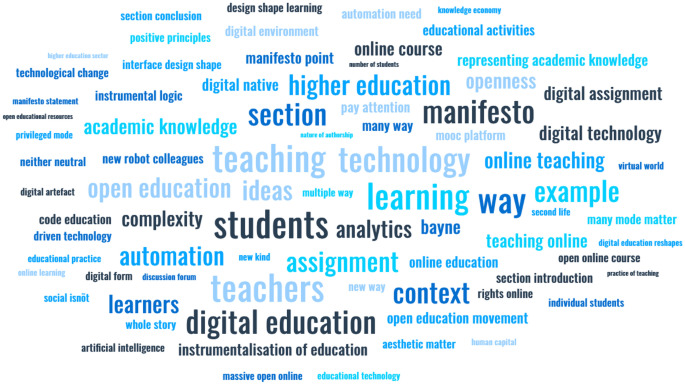
Online education has been growing in popularity over the past few years, and for good reason. With almost unlimited options available, online education allows students to get the education they need without having to leave their homes or travel long distances. However, one downside of online education is that it can be easy to become caught up in the individualist fallacy.
The individualist fallacy is the idea that each person is responsible for their own success or failure, and that no one can help you achieve your goals. This idea can be dangerous when applied to online education, because it can lead students to believe that they need to do everything on their own. In reality, there are many people who can help them achieve their goals – their professors, classmates, and online mentors are just a few examples. By taking advantage of these resources, students can make sure that they achieve their full potential in online education.
What is the individualist fallacy?
The individualist fallacy is a logical fallacy that states that the only way to achieve success or happiness is through self-sufficiency and independence. The problem with this thinking is that it ignores the communal aspects of life, which can be essential for both individual and collective success. For example, one person may be able to succeed in an isolated environment, but they would struggle when competing against teams or communities. Furthermore, self-reliance can lead to disaster if individuals are not prepared to face challenges on their own. For example, during the Great Depression, many people abandoned their farms due to the harsh economic conditions. This caused food shortages and led to widespread famine. In short, the individualist fallacy is counterproductive and can lead to negative outcomes.
The individualist fallacy is a common error in reasoning that occurs when people believe that the only way to achieve success or happiness is through personal achievement. This fallacy assumes that an individual can be completely autonomous and self-sufficient, which is not always the case. Other members of a community or society can also contribute to our well-being, and we are ultimately responsible for our own actions and outcomes.
The individualist fallacy is a cognitive bias that leads people to incorrectly conclude that the best way to achieve success or happiness is through personal initiative and effort. The fallacy is based on the false assumption that our individual actions are the only things that matter in life.
The individualist fallacy often manifests itself in two ways. The first is when people mistakenly think that if they work hard enough, they can attain any goal they want. The second is when people think that because they are the only person involved in a situation, their opinions and feelings are the only ones worth taking into account.
Both of these mistakes can lead to problems because they rely on self-reliance instead of cooperation. This type of thinking often results in loneliness and failure because no one else can help us achieve our goals. In fact, it’s often easier for others to help us than it is for us to help ourselves.
So why do we fall victim to the individualist fallacy? Scientists aren’t sure exactly why this bias exists, but there are a few suspects. One theory suggests that it’s rooted in our evolutionary history as hunter-gatherers. When we were living in small groups, it was important for each member of the tribe to contribute as much as possible so everyone could survive together. This meant working together towards common goals and cooperating instead of competing with each other.
However, today’s society doesn’t require as much cooperation from its citizens as it used to do back then.
The Rise of Online Education
Online education has grown increasingly popular in recent years, with many universities and colleges offering courses and programs online. However, this growth has come at a cost: the individualist fallacy.
The individualist fallacy is a cognitive bias that says people are more likely to succeed when they take responsibility for their own success or failure. In the context of online education, this means that students are more likely to succeed if they treat online learning as an individual effort rather than part of a collaborative process.
This mindset can have negative consequences for online learners. For example, some students may feel overwhelmed by the amount of material they need to learn in order to succeed in online courses. Others may give up too soon if they encounter difficulty or frustration during their coursework.
By relying on the individualist fallacy, online educators are limiting students’ opportunities to learn effectively and efficiently. It’s time we abandoned the individualistic approach in favor of more collaborative models that will help all students succeed
The Individualist Fallacy is hurting online education. It’s a fallacy that says the only way to learn is by interacting with other students in person. That’s not true anymore. You can learn just as well, or even better, by learning online. Online education has many benefits over traditional education, including:
-You can learn at your own pace
-You can access materials from anywhere
-You can get help when you need it
-You can assess your own progress
-You can be guaranteed a quality education
But the Individualist Fallacy is still alive and well in online education. People believe that if they don’t interact with other students in person, they’re not learning. This couldn’t be further from the truth. You can learn just as well, or even better, by learning online. The following are some of the benefits of online education:
1) You Can Learn At Your Own Pace – One of the biggest advantages of online education is that you can learn at your own pace. There’s no pressure to finish a course on time or to get good grades so that you can continue your education. In fact, some people believe that completing an online course gives them a higher level of satisfaction than completing a traditional course because they’ve had more control over their learning experience.
2) You Can Access Materials From Anywhere – Another advantage of online education is that you can access materials from anywhere in the world. This means you don
The Individualist Fallacy
The Individualist Fallacy is the belief that the best way to achieve success or happiness is to focus on oneself and pursue one’s own interests without regard for others. This fallacy is often seen in online education, where students are often encouraged to pursue their own goals independently of the class structure or other students.
This type of thinking can lead to problems, as it can create a competitive atmosphere that discourages collaboration and cooperation. It can also lead to students feeling isolated, as they are not reliant on others for success. In short, pursuing one’s own interests without regard for others can lead to negative consequences both in the short term and long term.
There are many people who believe that the only way to get good online education is to take individual courses. This is known as the individualist fallacy. The problem with this belief is that it’s not always possible to get the quality of education you need that way. There are a lot of factors involved in getting a good online education, and you can’t just rely on doing your own research. You also have to work with a tutor or professor if you want to get the most out of your classes.
Why This Fallacy Hurts Online Education
Individualism is a fallacy that harms online education. This fallacy is the belief that an individual’s success or failure is the only measure of worth. This belief leads students to think that they can only learn effectively if they are given complete control over their learning experience. However, this approach does not work well in a virtual setting where students cannot see or touch the material.
In a virtual setting, it is essential for instructors to scaffold learning so that each student can find his or her own path to mastery. Instead of giving students complete control, instructors should provide them with support and resources so that they can learn effectively and achieve their goals.
The individualist fallacy is a false belief that the only way to achieve success or happiness is through self-reliance. This fallacy harms online education because it promotes a mindset of isolation and self-reliance.
Many students who are struggling in online courses believe that they cannot succeed without doing their own research and working hard on their own. But this approach is not always successful. In fact, many students end up falling behind due to lack of collaboration and communication.
When students are working alone, they tend to focus on their own individual goals instead of working together towards a common goal. This can lead to frustration, difficulty understanding the material, and even failure.
Instead of promoting self-reliance, online education should encourage teamwork and collaboration. By promoting these skills, students will be able to succeed in online courses and develop critical thinking skills that will help them in any situation.





